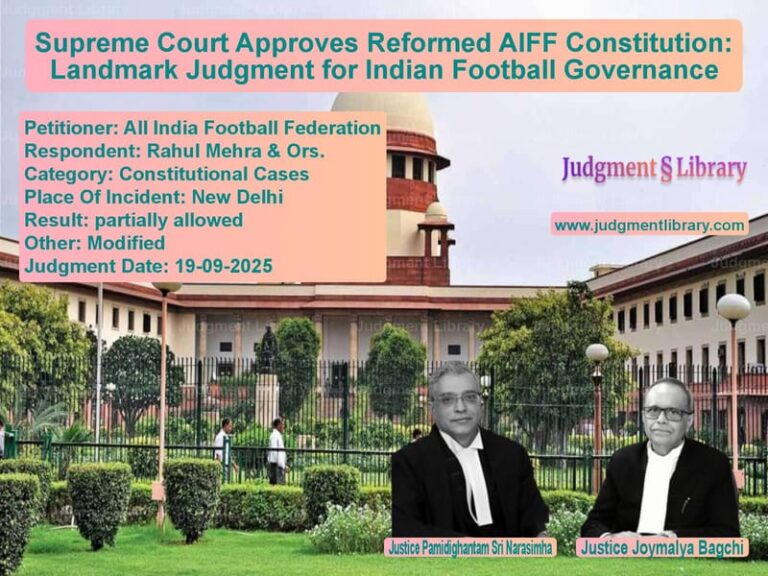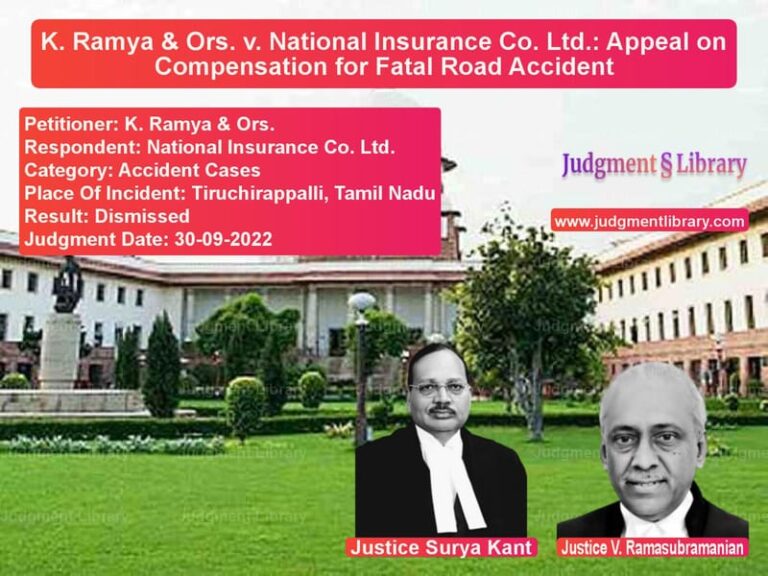Supreme Court Strikes Down Unlawful Minimum Wage Provisions in Haryana
The Supreme Court of India, in the case of Hindustan Sanitaryware and Industries Ltd. & Others v. The State of Haryana, ruled on the legality of certain provisions in the Haryana Government’s notifications regarding minimum wages. The Court struck down parts of the notifications that exceeded the jurisdiction of the government, particularly those related to wage classification, training period restrictions, and prohibition of wage segregation into components.
Background of the Case
The case arose from the Haryana Government’s notifications dated 27.06.2007 and 21.10.2015, issued under Section 5(2) of the Minimum Wages Act, 1948. These notifications revised the minimum wages for workers in different scheduled employments.
The key provisions of the notifications included:
- Unskilled employees with 10 years of experience would be categorized as Semi-Skilled “A.”
- After 3 years in Semi-Skilled “A,” employees would move to Semi-Skilled “B.”
- After 3 years in Skilled “A,” employees would be reclassified as Skilled “B.”
- Trainees would be paid 75% of the applicable wages but no less than the minimum wage for an unskilled worker.
- Minimum wages were linked to the Haryana State Working Consumer Price Index.
- Segregation of wages into components (e.g., basic pay and allowances) was prohibited.
- Security Inspectors, Security Officers, and Supervisors were included in the notification.
Several employers and industry associations challenged these provisions, arguing that they were beyond the government’s jurisdiction under the Minimum Wages Act.
Petitioners’ Arguments
The appellants, including Hindustan Sanitaryware and the Faridabad Industries Association, made the following key arguments:
- The government’s classification of employees based on experience was arbitrary and ultra vires the Minimum Wages Act.
- Prohibiting the segregation of wages into components was beyond the scope of the Act.
- Security Inspectors, Security Officers, and Supervisors do not fall under the definition of ‘employee’ in the Act.
- The government had no authority to limit the training period to one year.
- Trainees who were not paid wages should not be covered under the notification.
Respondent’s Arguments (State of Haryana)
The State of Haryana defended the notifications, arguing:
- The government has a duty under Article 43 of the Constitution to ensure fair wages for workers.
- The provisions were introduced to prevent worker exploitation and encourage fair compensation.
- The classification of employees was necessary to prevent wage stagnation.
- The notifications were issued based on recommendations from an expert committee.
Supreme Court’s Observations
The Supreme Court, in a judgment authored by Justices L. Nageswara Rao and M.R. Shah, made the following critical observations:
1. Classification of Workers is Beyond Government’s Jurisdiction
The Court ruled that the government has no authority to classify workers based on experience:
“Such categorization or classification by deeming workmen in one category to belong to another category is in direct contravention of the contract between the employer and the employee and is beyond the jurisdiction of the Government.”
2. Prohibition of Wage Segregation is Invalid
The Court found that the prohibition on wage segregation was not legally valid:
“There is no power vested in the Government under the Act to prohibit the segregation of wages into components.”
3. Security Officers and Supervisors Cannot Be Included
The Court ruled that these categories do not fall under the definition of ‘employee’ under Section 2(i) of the Act:
“Security inspector/ security officer/ security supervisor cannot be included in the Notification.”
4. Training Period Cannot Be Regulated by Government
The Court held that the duration of training should be determined by contract, not government notification:
“Fixing the training period to one year is beyond the jurisdiction of the Government.”
5. Trainees Without Pay Are Not Employees
The Court ruled that trainees who are not paid wages cannot be covered under the notification:
“Trainees who are not paid wages cannot be included in the notification, and the fixation of minimum wages for such trainees at 75% is not valid.”
Final Judgment
The Supreme Court struck down the following provisions of the Haryana Government’s notifications:
- Classification of workers based on experience.
- Inclusion of Security Inspectors, Security Officers, and Supervisors.
- Prohibition of wage segregation.
- Regulation of the training period.
- Coverage of unpaid trainees under the notification.
The Court ruled:
“For the aforementioned reasons, the appeals are allowed.”
Key Takeaways
- Government Cannot Modify Employment Contracts: The ruling clarifies that wage structures must align with existing employment contracts and the Minimum Wages Act.
- Prohibition of Wage Segregation is Invalid: Employers can continue structuring wages into components, such as basic pay and allowances.
- Security Officers and Supervisors Do Not Fall Under Minimum Wage Laws: This decision removes additional financial burdens on industries.
- Regulation of Training Period is Beyond Government’s Authority: Training durations must be determined contractually, not through government orders.
Conclusion
The Supreme Court’s ruling in Hindustan Sanitaryware and Industries Ltd. & Others v. The State of Haryana is a landmark decision that clarifies the limits of government power in fixing minimum wages. It ensures that employers retain autonomy over employment classifications and prevents unnecessary financial burdens resulting from government overreach. The judgment provides a balanced approach by safeguarding both industry interests and workers’ rights.
Petitioner Name: Hindustan Sanitaryware and Industries Ltd. & Others.Respondent Name: The State of Haryana.Judgment By: Justice L. Nageswara Rao, Justice M.R. Shah.Place Of Incident: Haryana.Judgment Date: 29-04-2019.
Don’t miss out on the full details! Download the complete judgment in PDF format below and gain valuable insights instantly!
Download Judgment: Hindustan Sanitarywa vs The State of Haryana Supreme Court of India Judgment Dated 29-04-2019.pdf
Direct Downlaod Judgment: Direct downlaod this Judgment
See all petitions in Employment Disputes
See all petitions in Public Sector Employees
See all petitions in Judgment by L. Nageswara Rao
See all petitions in Judgment by Mukeshkumar Rasikbhai Shah
See all petitions in allowed
See all petitions in supreme court of India judgments April 2019
See all petitions in 2019 judgments
See all posts in Service Matters Category
See all allowed petitions in Service Matters Category
See all Dismissed petitions in Service Matters Category
See all partially allowed petitions in Service Matters Category







